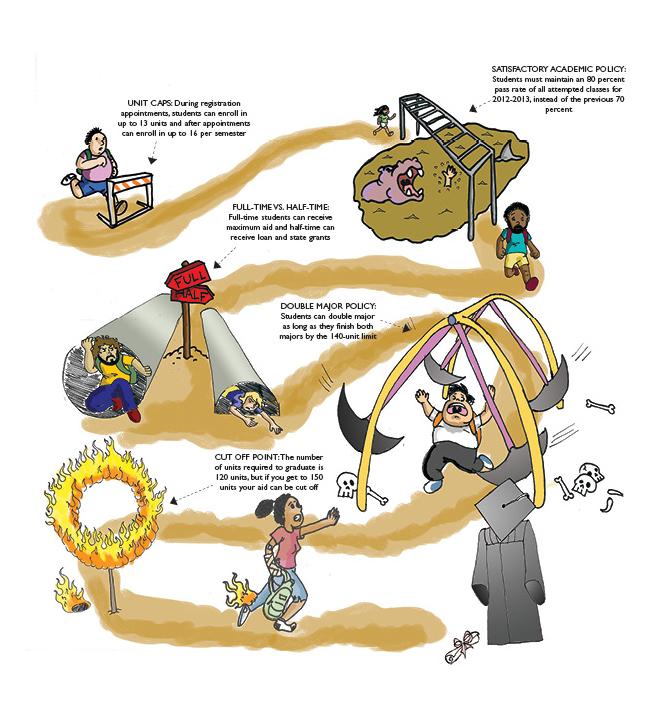
With only a semester away from receiving his bachelor’s degree in Asian-American studies, Marvin Jordan struggles to pay for his tuition. He is the first person in his family to go to college.
Jordan, 23, first encountered financial aid problems through an email he received in February notifying him of his failure to comply with the Satisfactory Academic Progress policy.
His financial aid was subject to cancellation if he did not raise his pass rate by the end of Spring 2012 to meet the new requirements.
He filed an appeal, but was denied after being unable to provide a compelling reason for not meeting the standards. Jordan’s financial aid was taken away after six years at CSUN and he was faced with the possibility of not graduating.
“I didn’t have enough time to bring up my pass rate,” Jordan said. “I only brought it up to 74 percent and now my family is struggling to pay for my education. I wouldn’t be at CSUN anymore if it wasn’t for them.”
In February, the CSU system sent an email to all students stating a change to its SAP policy. The new policy would call for students to maintain an 80 percent pass rate of all attempted classes for the 2012-13 financial aid award year instead of the previous 70 percent requirement.
This means students are required to pass at least 80 percent of all units they enroll in. Repeated courses and courses in which students received a fail, incomplete, no credit, withdrawal or withdrawal unauthorized also count toward the number of units attempted.
In accordance with the current SAP policy within the CSU, students receiving financial aid also face a 150-unit cap policy that threatens to cut off their aid, thus delaying their projected graduation date if they are unable to pay.
Students only need 120 units to graduate and cannot exceed 140 units if they are double majoring, according to the University Catalog.
“Students can have up to two majors and two minors as long as they can be completed in 140 units,” said Elizabeth Adams, senior director of CSUN’s Undergraduate Studies.
Daniel Mulato, a graduating senior double majoring in psychology and Chicano/a studies, is having trouble paying for the five units he has left this semester in order to receive his diploma. Having reached his 150-unit limit, he now faces disenrollment if unable to find the funds.
Mulato works at the Educational Opportunity Program office as a transitional program student assistant and sees first-hand how first-generation, low-income freshmen are faced with these challenges.
“What concerns me is the fact that these policies only affect a certain population,” Mulato said. “They don’t affect rich kids with parents who pay for their education. They affect low-income students coming from disadvantaged backgrounds.”
Loans and state grants require a minimum of half-time enrollment for eligibility Khashmanyan said. Although federal grants can be given to students with less than half-time enrollment, the aid amount is very minimal.
“Students who maintain full-time enrollment receive the maximum amount of aid,” said Armenka Khashmanyan, CSUN Financial Aid representative. “Otherwise, assistance can be reduced or cancelled depending on the source.”
Financial aid is helping students getting an education, but in return students have the responsibility to maintain good academic standing, according to Khashmanyan.
“Some students flip-flopping between majors take courses that aren’t required, or are just being ‘professional students,’ which are students who are only here for financial aid money rather than an education,” Khashmanyan said. “It isn’t CSU policies that are slowing down their expected graduation, it’s the student.”
In 2012, the number of units a student was allowed to take per semester was capped. What used to be a maximum of 17 units during registration appointments changed to the current 13 units. Once it is open enrollment, students can take up to 16 units. With a limit on the amount of units per semester, students are meeting the 120-unit graduation minimum at a much slower rate. Less units per semester means more semesters spent in school and delayed graduation dates for CSUN students.
According to Vice Provost Cynthia Rawitch, the 13-unit limit per semester and 150-unit cap on financial aid have actually improved graduation rates within the past few.
“We encourage students to graduate in a timely manner and be smarter about the units they take, but our students lead different lives with busy schedules,” Rawitch said. “Some will graduate in four years and others in six. But my focus is on units, not years.”





